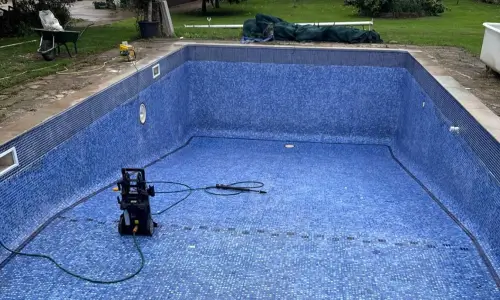A complete guide for pool owners in Milton Keynes, Buckinghamshire & Northamptonshire
As the autumn leaves start to fall and temperatures begin to dip, pool owners across Milton Keynes, Buckinghamshire, Bedfordshire and Northamptonshire start thinking about winterising their pools. Done right, closing your pool for winter can prevent costly repairs, preserve water quality, and make for an easier reopening come spring.
To help you get it right, we’ve compiled expert answers to some of the most frequently asked questions about winter pool care—along with a few you might not have thought to ask.
Q. Should I drain my swimming pool for winter?
Absolutely not. Draining your pool completely over winter can lead to major structural issues. Without the water to balance pressure on the pool walls, underground water can push against the sides and even cause collapse—particularly in areas with high water tables like parts of Buckinghamshire.
An empty pool is also highly susceptible to frost damage and becomes a serious safety hazard—essentially a large, empty hole in your garden.
Leave your pool full of water and treat it properly instead.
Q. Is it enough to just cover the pool and leave it?
Not quite. Simply covering the pool without winterising your plant room equipment is a recipe for disaster. If your pool pump, filter, heater, or sanitation devices are left holding water and your plant room isn’t heated, they can freeze and crack. This kind of damage can be extremely expensive to repair.
Top Tip:
Drain all water from your pump, filter, heater, chlorinators, UV units, and any exposed pipework. Even loops in pipework can trap water—undo unions and let everything drain fully.
Q. Do I need to add chemicals after closing my pool?
Yes—winter chemicals are essential. To prevent algae growth and keep the water clear through the cold months, we recommend adding:
- 20 litres of liquid chlorine
- A 6-month algaecide
This combination will maintain water clarity up until around February. At that point, another 20 litres of chlorine will typically see you through to April, just in time for reopening.
🌱 Eco Tip: Using a winter chemical kit also helps minimise the need to drain and refill your pool in spring, saving water and reducing your environmental impact.
Q. Should I fit a winter cover or leave the bubble cover on?
A winter cover is the better option. While bubble covers are great in summer for heat retention, they’re not suitable for harsh weather. Winter covers:
- Prevent leaves and debris from entering the pool
- Stop wildlife from falling in
- Allow only water through (not dirt)
- Help protect the tile band from frost
- Keep the pool looking tidy during the off-season
If your pool has a manual roller and summer bubble cover, swap it out for a proper winter cover—it’s well worth the investment.
Q. Can I delay repairs to tile bands or coping stones until spring?
We wouldn’t recommend it. Winter is actually the best time for carrying out refurbishment works, especially in our region where spring can bring a rush of new builds and reopenings.
Leaving cracked coping stones, damaged tile bands, or worn grout until March often leads to delays—and potentially worsened damage due to frost and moisture ingress over winter.
At Mosaic Swimming Pools, we carry out pool refurbishments and rebuilds from September through to March, only pausing during the coldest weather spells. This gives our clients a stress-free reopening come springtime.
Q. Is it okay to leave my pool lights in place over winter?
Yes, but only if your pool remains filled and the lights are fully submerged. Pool lights are designed to stay in water, which helps regulate their temperature and prevents damage. If you’re winterising properly and maintaining water levels, you can leave them be.
Q. How often should I check the pool during winter?
While your pool will be largely dormant, it’s wise to check the cover, water level, and equipment at least once a month. Look for:
- Tears or sagging in the winter cover
- Excess debris accumulation
- Pool water level dropping too low (could damage skimmers if left unchecked)
- Leaks or drips in plant room pipework
A quick check every few weeks goes a long way in preventing springtime surprises.
Final Thoughts from the Experts
Winter pool care is all about protection, prevention, and planning ahead. Done right, it can extend the life of your equipment, keep your pool water in good condition, and reduce your spring maintenance burden.
With over 45 years of experience, we at Mosaic Swimming Pools & Spas specialise in pool design, refurbishment, and seasonal maintenance throughout Milton Keynes, Northamptonshire, Bedfordshire and Buckinghamshire. Whether you’re thinking about repairs, a complete refurbishment, or simply want help with winterising your pool—we’re here to help.
